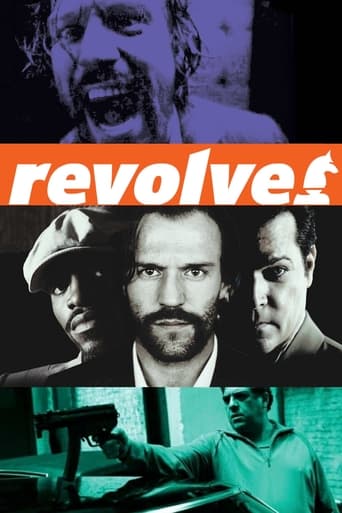Blucher
One of the worst movies I've ever seen
Fairaher
The film makes a home in your brain and the only cure is to see it again.
Ava-Grace Willis
Story: It's very simple but honestly that is fine.
Yash Wade
Close shines in drama with strong language, adult themes.
Fujiko-san
I don't even know where to start. The premise is a very interesting one, but the script is full of useless characters and stylistic flourishes that confuse and bewilder. At one point in the middle, I even thought I had perhaps taken acid by mistake. The sudden dive into flashes of hand-drawn animation are never explained or even justified. We are treated to endless, mind-numbing flashbacks, unexpectedly lacklustre acting by Andre 3000, the dialog (or voice over) is ofttimes cliche and tacked together, there are characters and plot lines that make no sense (though some are quite charming)... Basically, the script is terrible. There is no getting around it- despite valiant efforts from Liotta and Stratham.Visually it is VERY interesting, however. The decors are off the hook. The koreans are pretty amazing and every scene their boss is in- well freaking electric.
There is this killer played by Mark Strong (I always have a soft spot for him) and this little girl who deserve a story all their own. This cannot save the weak ending, however, (par for the course) and the vague moral lacks punch and does the message a terrible disservice.
blanchjoe
Under the guise of a standard "shootem-up" action movie, even going to the point of hiring standard well trained action movie actors, this is instead, and in actuality, an exploration into the nature of the individuated-self sense, and the meaning of how we perceive.For those seeking entertainment, or a well directed action movie, you will be confused, frustrated, and disappointed. This is not a conventional film, and it is dealing with a wholly unconventional subject, one that the vast majority of viewers will not understand.The hero of this story must completely awaken from the dream of his conditional existence and the limited individuated egoic "self" cannot be accomplished by "one's-self".That which supports and maintains perception accomplishes that process, and the process requires the complete transcendence and dissolution of the egoic self, via absolute surrender of the process of attention away from the individuated self sense, onto that which support, sustains and is "not" the individuated self sense.In many ways this film is a Luc Besson / Guy Ritche modern Koan.Checkmate.
Prismark10
Guy Ritchie has made a stylish but incoherent film which at times is as fake as Jason Statham's wig and the green screened background.Statham plays Jake Green a gambler who spent some years in solitary confinement and is seeking revenge against casino owner Dorothy Macha (Ray Liotta) who put him in jail.Jake was confined in a prison cell between two others, one was a chess master, the other a con man. They all planned to escape together but they escaped leaving Jake behind. Jake has learned a lot spending time between these two people and has learned of the formula that would bring him success in gambling which it does when he leaves prison.When Jake has a blackout he discovers he only has three days to live when he is approached by two loan sharks Zack (Vincent Pastore) and Avi (André Benjamin.) They offer him protection from a hit-man hired by Macha but in return they want Jake to give them all his money and not to question them why.Jake thinks all this might be a con and then their is the shadowy figure of Sam Gold who many people fear. Is Gold actually Jake or just a figment of his imagination?The film loses the plot by the end, it really is a confusing mess. The film adheres to some Kabbalah principles but it means nothing if you know little about Kabbalah.
forrest-welsh
Guy Ritchie's Revolver is a crime/drama similar to his previous works of "Snatch" (2000) and " Lock, Stock and Two Smoking Barrels" (1998), however, the film was panned as a critical failure and did not live up to his previous bodies of work based on the opinions of many. The film is Guy Ritchie's 3md film, which focuses on the lives of professional English criminals. The film stars Jason Statham as the protagonist, who appears in all three of Ritchie's works. Statham is cast often as a major character, whom is important to the plot and story development. Due to its pre-convinced genre, the critical framework of the crime/drama genre was often used by critics to determine its value and thus missed its value as a mystery film. Many of the plot twists and unexpected developments are not typical to the crime/drama genre and thus confuse and upset the audience, whose expectations are subverted in a manner that they may not have expected or wanted. While the film uses many aspects and iconography of his previous films; such as similar mise en scene, long term character development techniques, quick cut camera work and fast paced editing. Guy Ritchie's films also have a particular "iconography", as many of the same actors are used in different character roles throughout his films. In addition, throughout his films, the "criminals" always seem to wear suits. Whether this is an intentional metaphor, or just for aesthetic appeal, the attire of the actor adds an air of class to an otherwise bleak and dark setting. Being of the Crime/Drama genre, the film techniques used often portray darkly lit settings, with bleak or sombre music over-toning the atmosphere. Contrary to his previous films, Revolver is shot almost entirely in the dark lighting, mostly featuring night-time settings, with very little natural light shown during the 115 minute feature. The complexity of the narrative makes the film vastly more confusing than the simplistic plot lines of his two previous successful box office hits. Neal (1990) asserts that from a cultural perspective, films have a preconceived norm, i.e the crime genre draws on authenticity, as it is important to convey a sense of realism to make plot-lines seems plausible and engaging. In this way, the film also defies its own verisimilitude, as it pretends to be of the crime genre, or that of the drama genre, but in reality explores a multitude of aspects from the genre pool. Many critics often assert that the film's overall complexity alienates a vast majority of the audience and thus makes the film's themes and morality inaccessible to the audience. (Mark Kermode, 2009) The film also explores the physical notion of " Kabbalah" which, " is an ancient wisdom that reveals how the universe and life works". It is the study of how to receive fulfillment in our lives. These themes are introduced in the prologue of the film via typographical quotes--mainly quotes from Julius Caesar and Niccolo Machiavelli. This subject is further reinforced in the epilogue, where documentary style interviews with renowned philosopher academics discuss the meaning of "Kabbalah" and how it affects our everyday lives. The film also breaks genre boundaries during the third act and switches its focus from the criminal element, to that of a question on self- enlightenment and discovery. This genre switch from crime to Art House Esque may have seemed too abrupt and unexpected for the wider audience and shaped some negative opinions that the film received.

